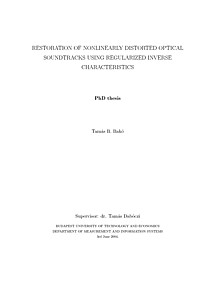
Restoration of Nonlinearly Distorted Optical Soundtracks Using Regularized Inverse Characteristics
This dissertation is concerned with the possibilities of restoration of degraded film-sound. The sound-quality of old films are often not acceptable, which means that the sound is so noisy and distorted that the listener have to take strong efforts to understand the conversations in the film. In this case the film cannot give artistic enjoyment to the listener. This is the reason that several old films cannot be presented in movies or television. The quality of these films can be improved by digital restoration techniques. Since we do not have access to the original signal, only the distorted one, therefore we cannot adjust recording parameters or recording techniques. The only possibility is to post-compensate the signal to produce a better estimate about the undistorted, noiseless signal. In this dissertation new methods are proposed for fast and efficient restoration of nonlinear distortions in the optically recorded film soundtracks. First the nonlinear models and nonlinear restoration techniques are surveyed and the ill-posedness of nonlinear post-compensation (the extreme sensitivity to noise) is explained. The effects and sources of linear and nonlinear distortions at optical soundtracks are also described. A new method is proposed to overcome the ill-posedness of the restoration problem and to get an optimal result. The effectiveness of the algorithm is proven by simulations and restoration of real film-sound signals.


















